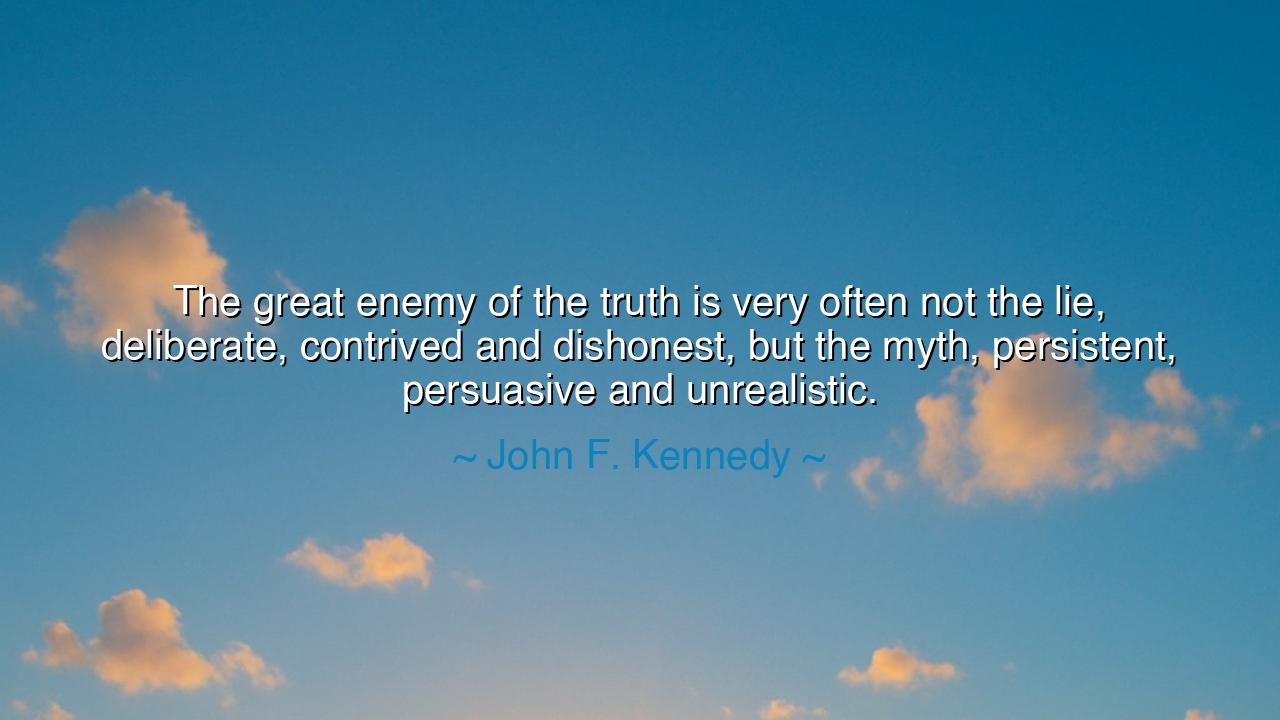
The great enemy of the truth is very often not the lie
The great enemy of the truth is very often not the lie, deliberate, contrived and dishonest, but the myth, persistent, persuasive and unrealistic.






“The great enemy of the truth is very often not the lie, deliberate, contrived and dishonest, but the myth, persistent, persuasive and unrealistic.” — John F. Kennedy
Thus spoke John F. Kennedy, the leader of a restless age, a man who stood at the crossroads of hope and peril. His words strike not merely as a warning, but as a revelation — that truth, the most sacred of all treasures, is not most often slain by malice, but by illusion. For the lie, though vile, is seen for what it is; it can be challenged, exposed, and overcome. But the myth — clothed in the garments of half-truth and beauty — deceives not by force, but by persuasion. It seeps quietly into the hearts of men until they mistake it for wisdom itself.
The origin of this quote lies in Kennedy’s deep understanding of history and of human nature. In an age shadowed by the Cold War, when the struggle between nations was as much a battle of ideas as of arms, he saw how myths could blind entire peoples. Myths of superiority, of invincibility, of righteousness without fault — these, he knew, were far more dangerous than lies. For a lie dies when truth is spoken against it; but a myth endures, passed down through generations, defended not by deceit but by devotion. Kennedy, ever the student of the ancients, echoed here a wisdom as old as the philosophers: that the most dangerous falsehoods are those we cherish as sacred truths.
Consider the myths that have led civilizations astray. The Romans believed their empire eternal — a myth that blinded them to the decay within. The French aristocracy believed themselves divinely appointed — a myth that brought upon them the fires of revolution. Even in modern times, nations have fallen not because of enemies without, but because of illusions within — myths of moral perfection, of unending prosperity, of progress without cost. These myths, though comforting, render societies unable to face their own flaws, and thus, unable to heal them.
The lie is the weapon of the cunning; the myth is the poison of the complacent. The liar knows his deception; the believer of myth does not. That is why myths are so dangerous — they charm the heart while clouding the mind. A myth need not be false in every detail; it need only distort the balance of truth. It paints the world in absolutes — heroes without fault, enemies without virtue, causes without consequence. And in this blindness, people surrender the sacred gift of reason for the comfort of certainty.
Kennedy’s warning, then, is not only political but profoundly moral. He calls us to awaken from the sleep of easy narratives — to challenge even the beliefs that flatter us. For truth is not found in what pleases, but in what illuminates. To seek truth is to endure discomfort; to face reality is to confront imperfection, both in others and in oneself. As in the days of Socrates, who defied the myths of Athens and paid with his life, so too must every age learn that truth is a demanding companion. It does not whisper sweetly; it speaks with fire.
Let this, then, be the lesson: guard your mind not only against lies, but against comfortable myths. Question what you are told, especially what you most wish to believe. Ask always — does this truth serve the world, or only my pride? The myth seduces with simplicity; truth humbles with complexity. The myth divides; truth reconciles. Only those who dare to pierce illusion can see the world as it is — vast, imperfect, and yet beautiful in its honesty.
So, my child of the future, remember Kennedy’s wisdom. Beware of myths that soothe the ego and silence the conscience. Whether in the affairs of nations or the quiet battles of the soul, the enemy of truth often comes not with deceitful words, but with comforting ones. Seek the light that blinds before it guides. For the world has no greater need than those who love truth more than legend — who would rather face the storm of reality than bask in the calm of illusion. To such souls belongs not only wisdom, but freedom itself.






AAdministratorAdministrator
Welcome, honored guests. Please leave a comment, we will respond soon